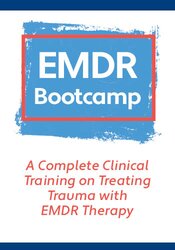

Introducing the EMDR Bootcamp – A live online training experience designed to transform you into an EMDR therapist.
You’ll join Laura Swinford, a certified EMDR clinician, approved consultant and EMDR instructor whose trainings have helped hundreds of clinicians just like you bring EMDR into their practices.
Laura will guide you step by step, breaking down each key element of the EMDR process ensuring you leave the bootcamp with a complete understanding of how to treat trauma using EMDR therapy.
The Results You Can Expect:
Unlike other courses that rely on pre-recorded videos, you’ll experience live, interactive sessions with an experienced EMDR trainer so you can ask questions and engage in exercises that make the material stick.
EMDR therapy is one of the most respected and trusted trauma treatments available today.
Don’t miss this chance to learn exactly how to use it in just 3 days.
Purchase now and reserve your spot in the EMDR Bootcamp today!
Planning Committee Disclosure - No relevant relationships
All members of the 小蝌蚪视频. planning committee have provided disclosures of financial relationships with ineligible organizations and any relevant non-financial relationships prior to planning content for this activity. None of the committee members had relevant financial relationships with ineligible companies or other potentially biasing relationships to disclose to learners. For speaker disclosures, please see the faculty biography.
Continuing education credit information is coming soon for this non-interactive self-study package.
CE hours may be available for select professions, as listed in the target audience. Hours will be dependent on the actual recording time. Please check with your state licensing board or organization for specific requirements.
There may be an additional fee for CE certificates. Please contact our Customer Service at 1-800-844-8260 for more details.
**Materials that are included in this course may include interventions and modalities that are beyond the authorized practice of your profession. As a licensed professional, you are responsible for reviewing the scope of practice, including activities that are defined in law as beyond the boundaries of practice in accordance with and in compliance with your professions standards.

Laura Swinford, LCSW, EMDR-C, is certified in EMDR, trains therapists as part of 小蝌蚪视频’s 6-month EMDR Certification Program and provides EMDR consultation. She works as a therapist in a group private practice specializing in the treatment of trauma using EMDR, Ego State Therapy and Somatic Experiencing®. She has been certified in EMDR for nearly a decade and has used it with clients over that span to help them better process their past traumas and increase their ability to identify and cope with destructive emotions. She has more than 15 years of clinical experience and is also a published author of research work in the mental health field. Ms. Swinford previously served as an adjunct professor at University of Illinois Champaign-Urbana, where she taught evidence-based treatment to master’s level students. Ms. Swinford believes in connection and relationship as she journeys through life. She brings this approach to her work, matching techniques to the needs of her clients.
Speaker Disclosures:
Financial: Laura Swinford has employment relationships with the University of Illinois and Crisis Nursery. She receives a speaking honorarium and recording royalties from 小蝌蚪视频. She has no relevant financial relationships with ineligible organizations.
Non-financial: Laura Swinford has no relevant non-financial relationships.
Access never expires for this product.
Visit our FAQ page at www.pesi.com/faq or contact us at www.pesi.com/info
Day 1
Day 2
Day 3
Satisfaction Guarantee
Your satisfaction is our goal and our guarantee. Concerns should be addressed to: PO Box 1000, Eau Claire, WI 54702-1000 or call 1-800-844-8260.
ADA Needs
We would be happy to accommodate your ADA needs; please call our Customer Service Department for more information at 1-800-844-8260.
小蝌蚪视频 Mobile App
Access CE trainings on your phone or tablet through our free mobile app. Choose video or audio-only versions of online courses from the world’s best instructors, and complete your CE requirements anywhere, anytime, at your own pace.
Please wait ...